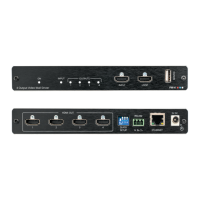Protocol handshaking.
Validates the Protocol
3000 connection and gets
the machine number.
Step-in master products
use this command to
identify the availability of
a device.
COMMAND
#<CR>
FEEDBACK
~nn@ok<CR><LF>
Set bezel On/Off, H/V
correction.
COMMAND
#BEZELout_index,hv_value,switch,h_value,v_value<CR>
FEEDBACK
~nn@BEZELout_index,hv_value,switch,h_value,v_value<CR><LF
>
out_index – 0
hv_value –
0 – current H/V value
1 – max. H/V value
switch – Enable/Disable bezel
correction
0 – Off
1 – On
h_value – Horizontal correction
values
v_value – Vertical correction values
Set bezel On with H/V
correction:
#BEZEL1,0,1,12,24<CR>
Get bezel switch, H/V
correction status.
COMMAND
#BEZEL?<CR>
FEEDBACK
~nn@BEZELout_index,hv_value,switch,h_value,v_value<CR><LF
>
out_index – 0
hv_value –
0 – current H/V value
1 – max. H/V value
switch – Enable/Disable bezel
correction
0 – Off
1 – On
h_value – Horizontal correction
values
v_value – Vertical correction values
Get bezel switch, H/V
correction status:
#BEZEL?1<CR>
COMMAND
#BUILD-DATE?<CR>
FEEDBACK
~nn@BUILD-DATEdate,time<CR><LF>
date – Format: YYYY/MM/DD where
YYYY = Year
MM = Month
DD = Day
time – Format: hh:mm:ss where
hh = hours
mm = minutes
ss = seconds
Get the device build date:
#BUILD-DATE?<CR>
Copy EDID data from the
output to the input
EEPROM.
Destination bitmap
size depends on device
properties (for 64 inputs it
is a 64-bit word).
Example: bitmap 0x0013
means inputs 1,2 and 5
are loaded with the new
EDID.
In certain products
Safe_mode is an optional
parameter. See the HELP
command for its
availability.
COMMAND
#CPEDIDedid_io,src_id,edid_io,dest_bitmap<CR>
or
#CPEDIDedid_io,src_id,edid_io,dest_bitmap<CR>
FEEDBACK
~nn@CPEDIDedid_io,src_id,edid_io,dest_bitmap<CR><LF>
~nn@CPEDIDedid_io,src_id,edid_io,dest_bitmap <CR><LF>
edid_io – EDID source type
1 – Output
src_id – Number of chosen source
stage
0 – Default EDID source
1 – HDMI OUT 1
2 – HDMI OUT 2
3 – HDMI OUT 3
4 – HDMI OUT 4
edid_io – EDID destination type
(usually input)
0 – Input
dest_bitmap – 1
Copy the EDID data from the
Output 1 (EDID source) to the
Input:
#CPEDID1,1,0,1<CR>
GET EDID data from the
output to the input
EEPROM.
COMMAND
#CPEDID?<CR>
FEEDBACK
~nn@CPEDIDedid_io,src_id,edid_io,dest_bitmap<CR><LF>
edid_io – EDID source type
1 – Output
src_id – Number of chosen source
stage
0 – Default EDID source
1 – HDMI OUT 1
2 – HDMI OUT 2
3 – HDMI OUT 3
4 – HDMI OUT 4
edid_io – EDID destination type
(usually input)
0 – Input
dest_bitmap – 1
Get the EDID data from the
Output 1 (EDID source) to the
Input:
#CPEDID?<CR>
COMMAND
#DISPLAY?out_index<CR>
FEEDBACK
~nn@DISPLAYout_index,status<CR><LF>
out_index – Number that indicates
the specific output:
1-4
status – HPD status according to
signal validation
0 – Signal or sink is not valid
1 – Signal or sink is valid
2 – Sink and EDID is
valid
Get the output HPD status of
Output 1:
#DISPLAY?1<CR>
Get the DIP-switch state.
COMMAND
#DPSW-STATUS?dip_id<CR>
FEEDBACK
~nn@DPSW-STATUSdip_id,status<CR><LF>
dip_id – 1 to 4 (number of DIP
switches)
status – Up/down
0 – Up
1 – Down
get the DIP-switch 2 status:
#DPSW-STATUS?2<CR>
Set Ethernet port
protocol.
If the port number you
enter is already in use, an
error is returned.
The port number must be
within the following range:
0-(2^16-1).
COMMAND
#ETH-PORTport_type,port_id<CR>
FEEDBACK
~nn@ETH-PORTport_type,port_id<CR><LF>
port_type – TCP/UDP
port_id – TCP/UDP port number
(0 – 65535)
Set the Ethernet port protocol
for TCP to port 12457:
#ETH-PORT0,12457<CR>

